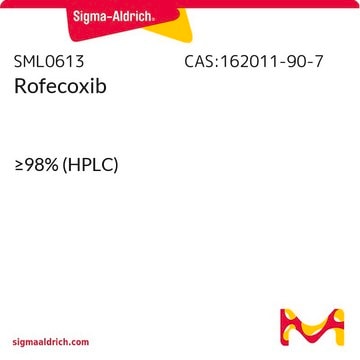F8514
Flurbiprofen
cyclooxygenase inhibitor
Synonym(s):
(±)-2-Fluoro-α-methyl-4-biphenylacetic acid, L-790,330
About This Item
Recommended Products
biological source
synthetic
Assay
≥98.5% (HPLC)
form
powder
color
white to off-white
mp
110-112 °C (lit.)
solubility
methanol: 50 mg/mL
antibiotic activity spectrum
fungi
Mode of action
enzyme | inhibits
SMILES string
CC(C(O)=O)c1ccc(c(F)c1)-c2ccccc2
InChI
1S/C15H13FO2/c1-10(15(17)18)12-7-8-13(14(16)9-12)11-5-3-2-4-6-11/h2-10H,1H3,(H,17,18)
InChI key
SYTBZMRGLBWNTM-UHFFFAOYSA-N
Gene Information
human ... ALB(213) , APP(351) , CYP1A2(1544) , CYP2C9(1559) , PTGS1(5742) , PTGS2(5743)
rat ... Ptgs1(24693)
Looking for similar products? Visit Product Comparison Guide
Related Categories
Application
Biochem/physiol Actions
Signal Word
Danger
Hazard Statements
Precautionary Statements
Hazard Classifications
Acute Tox. 3 Oral
Storage Class Code
6.1C - Combustible acute toxic Cat.3 / toxic compounds or compounds which causing chronic effects
WGK
WGK 3
Flash Point(F)
Not applicable
Flash Point(C)
Not applicable
Personal Protective Equipment
Certificates of Analysis (COA)
Search for Certificates of Analysis (COA) by entering the products Lot/Batch Number. Lot and Batch Numbers can be found on a product’s label following the words ‘Lot’ or ‘Batch’.
Already Own This Product?
Find documentation for the products that you have recently purchased in the Document Library.
Customers Also Viewed
Chromatograms
application for HPLCapplication for HPLCOur team of scientists has experience in all areas of research including Life Science, Material Science, Chemical Synthesis, Chromatography, Analytical and many others.
Contact Technical Service












